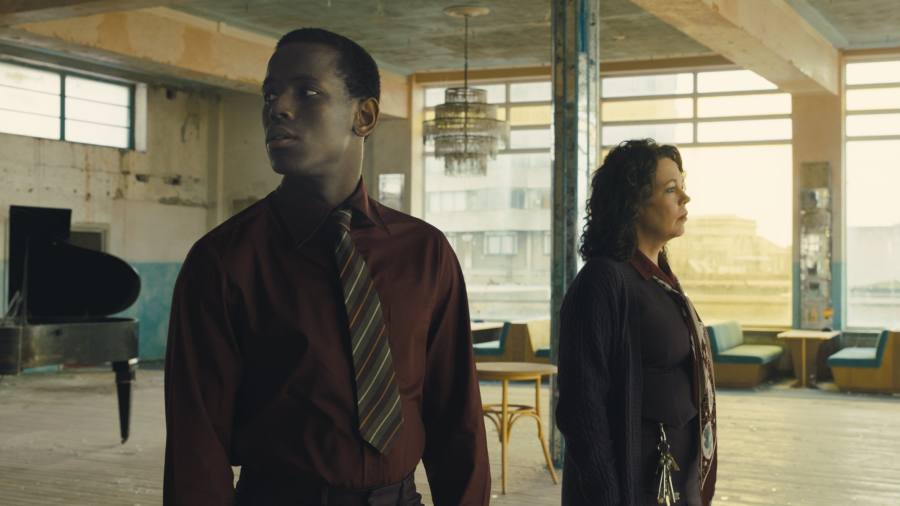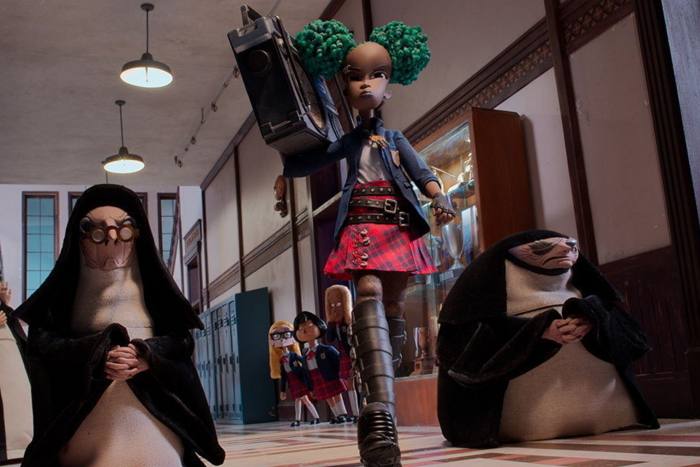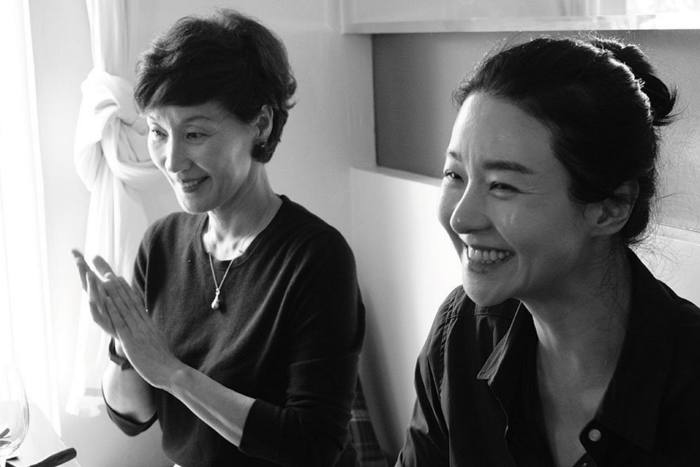
The flood of screenings continued in the second week of the Toronto International Film Festival, led by Sam Mendes’s Empire of Light, a highly anticipated potential juggernaut of the awards season. The director’s first world war epic, 1917, was overshadowed at the 2020 Academy Awards by Parasite’s historic wins, and it’s tempting to take Mendes’s new film as a concerted attempt to win over audiences and voters. Tempting, because it seems absolutely to be the case.
Empire of Light is set in a movie palace by the English seaside, shot in warm tones like a homey secular church by master cinematographer Roger Deakins. The year is 1981 (judging from a prominent screening of Chariots of Fire) and Olivia Colman plays Hilary, a depressive manager at the cinema. Her boss (Colin Firth) calls her into his office for sexual favours, which she seems to welcome as a change of pace from her lithium-numbed existence. Though she has an affable circle of colleagues, it’s a handsome young arrival, Stephen (Micheal Ward), who draws her out of her shell in a disused wing of the cinema, where he tends to an injured pigeon.
Stephen becomes a vessel for Hilary’s rejuvenation, partly through the occasional snog. Mendes’s methodical screenplay never quite explains why she holds such an attraction for him, and his anodyne selflessness begins to seem convenient. It’s doubly unfortunate because Stephen happens to be black and, as the racism of early 1980s Britain rears its head, the story feels manipulative in setting up violent scenarios that are mainly viewed in terms of their impact on Hilary, not Stephen.
Yet Empire of Light cruises along obliviously, cushioned by its artfully muffled piano score. Preconceptions of the film as a love letter to cinema seem misplaced, more a way of softening the actual content of the film, which includes Hilary’s fierce schizophrenic episodes and the activities of a racist mob. The movie has a genial sense of humour, and there are cute moments among Hilary’s circle of colleagues (with Toby Jones as a pernickety projectionist). But it’s hard to buy into its cathartic vision of a unifying cinema in a film with a dubiously lopsided approach to its leads.

Perhaps it was the self-seriousness of Toronto’s various movies with messages, but a welcome respite came with Wendell & Wild. The rambunctious animated feature teams Henry Selick, director of The Nightmare Before Christmas and Coraline, and a reunited Keegan-Michael Key and Jordan Peele. It follows an orphaned teen, Kat (Lyric Ross), as she sulks her way through a boarding school, while two demons journey into our world from hell to test a resurrection technique involving hair cream.
The afterlife as a setting is not uncommon in the realm of children’s animation, but not every movie stars Key and Peele as underworld underlings whose job is to stoke the hair follicles of a greater demon. Eccentric touches like that — or the fact that a character who later helps Kat inexplicably resembles a turtlenecked Marlon Brando circa the 1970s — give the movie a certain spark. But what makes it soar is Selick’s vibrant visual design, even when the plot settles into a conventional groove (foiling a gentrification scheme by villainous developers). The colours, patterning and character designs all reward scrutiny from one sequence to the next.

The international selection can be dauntingly vast at Toronto, but it’s worth singling out a world premiere by Korea’s pre-eminent independent auteur, Hong Sang-soo. He continues to make two films almost every year, each one ordinary in setting and yet experimental in some way. Walk Up, like so many of his other films, begins with a beguilingly simple set-up, as if we’ve stumbled into a conversation midstream without knowing its purpose. This time, a fading film-maker, Byung-soo (Kwon Haehyo), brings his daughter to an old friend’s house for a design apprenticeship. There seems to be a flicker of an old flame between Byung-soo and his friend, who has unorthodox views on being a landlord.
The set-up drifts into unforeseen directions as Hong dials the clock forward, at first a little, then a lot. The locale, however, stays constant, and so we effectively follow Byung-soo as his life grows entwined with the building. He tacks between being controlling and apathetic — a twinning of moods that seems fitting for an underemployed director — and, as with a stop-motion film of a growing plant, we see him and his relationships evolve. All of which is quietly radical but carried off by Hong in an assuredly casual way.

Another film that uses cinema to span time in compelling ways is My Imaginary Country, the latest documentary from Chilean cine-historian Patricio Guzmán. The essayist film-maker adds a new chapter to his life-long chronicle of Chile’s evolution from Allende through Pinochet and beyond: the historic mass demonstrations that led to the creation of a new constitution (albeit one that was rejected in a recent referendum). Guzmán, whose Battle of Chile dissected the overthrow of socialist Chile in the early 1970s, interviews the diverse protesters who organised and pushed for change from a sclerotic government. Reflective but not overbearing, Guzmán gets out of the way of his subjects, ceding the spotlight to new generations and marvelling at their good works.
Finally, it would be a shame not to recognise a couple of curios at the festival. Carmen, directed by choreographer Benjamin Millepied, may not exactly be an adaptation of, well, Carmen, but it is a grandiose spectacle that feels grounded in movement even when no one’s dancing. And Self-Portrait As a Coffee Pot shows the illustrator-artist William Kentridge at play in his studio, finding a hundred different ways to think aloud (including talking to his own double). It is a fitting reminder that Toronto is back on track in supplying the world with an invigorating array of movies.
tiff.net